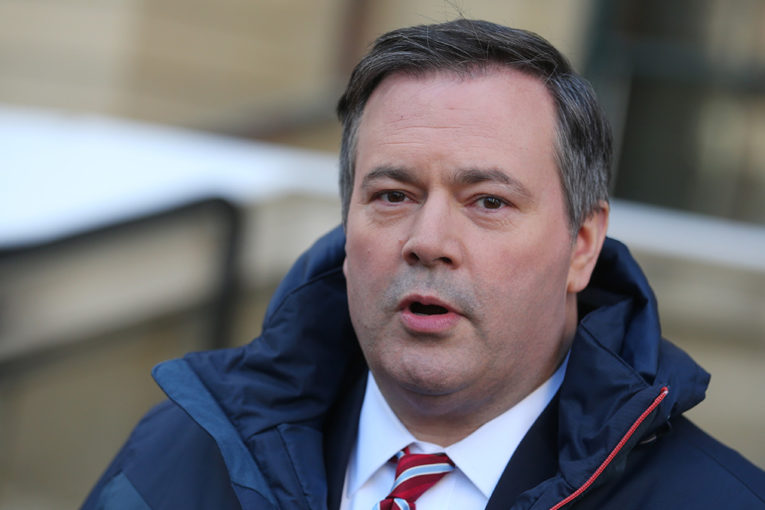
Jason Kenney says the Notley government blinked first in the battle with British Columbia over pipelines — and the wine ban should not be withdrawn.
The United Conservative Party leader said Friday that B.C. is attempting to drag out the conflict over the Trans Mountain pipeline by referring a proposed restriction on oil shipments to the courts.
On Thursday, Premier Rachel Notley said “B.C. blinked” in its attempt to study regulations that would limit increased shipments of diluted bitumen through that province, and it’s “stepping back from the brink and abiding by the law.”
In response, Alberta will suspend its embargo on B.C. wine imports, which began earlier this month.
But Kenney said Alberta needs to keep up the pressure on B.C. Premier John Horgan as he attempts to sidetrack the Trans Mountain pipeline expansion, a $7.4-billion project that will triple the amount of oil moving from Alberta to the Pacific coast.
“The Alberta NDP blinked in the face of more delay tactics by their fellow New Democrats in British Columbia,” he told reporters at McDougall Centre.
“In the face of this obvious transparent delay tactic by the B.C. government, I regret to see that Premier Notley has folded.”
Horgan announced Thursday he was changing course on a contentious proposal first discussed by his NDP government last month. In part, it would restrict increased shipments of diluted bitumen through the western province by pipeline or rail.
However, the federal government has authority over interprovincial pipelines, such as Trans Mountain, which runs from the Edmonton area to Burnaby, B.C.
Both the National Energy Board and federal government have already approved the pipeline expansion by Kinder Morgan.
Horgan said he still believes his government has authority to protect the environment in the matter, but will ask legal experts to draft a constitutional reference question to submit to the courts.
Both Notley and the Trudeau government expressed confidence B.C. can’t impinge on federal authority in this area.
“Federal jurisdiction in this matter is clear,” said a statement from Laurel Munroe, spokesperson for Natural Resources Minister Jim Carr.
“Multiple courts, including the Supreme Court of Canada, have affirmed the federal government’s jurisdiction over interprovincial pipelines and we will continue to vigorously protect that jurisdiction.”
While Alberta will suspend its ban on B.C. wine imports, Notley left open the door for renewed retaliation, if necessary.
“If it becomes clear that this action is, in fact, part of a deliberate strategy to harass the pipeline and its investors with frivolous or unconstitutional legal challenges, we will act immediately,” she said.
Kenney said the court challenge could take two to four years to conclude and will only add more legal uncertainty to the situation.
The B.C. government and pipeline opponents are trying to drag the process out, implementing a strategy of “death through delay,” he said.
“I would have responded by saying this is unacceptable,” Kenney added. “I would not have lifted the wine boycott.”
It remains unclear what specific legal question the B.C. government will bring forward.
University of Calgary law professor Martin Olszynski, who specializes in natural resource issues, said Horgan has the right and ability to refer a question to the courts.
But previous legal decisions have shown the NEB and Ottawa have jurisdiction on interprovincial pipelines and it’s unlikely B.C. will ultimately prevail, he said.
Eric Adams, an associate professor in constitutional law at the University of Alberta, said judges will look for a relatively clear question so they can provide a concrete answer.
He agrees it’s unlikely B.C. will be able to win, but it will take time for the matter to be resolved.
“It’s a formal process, which dials down the temperature of the political fighting,” Adams said of B.C.’s latest move.
“But at the same time, it’s not likely to be resolved quickly and may continue to inject uncertainty that (the) opponents of the pipeline are intending to achieve.”
You can read more of the news on source
